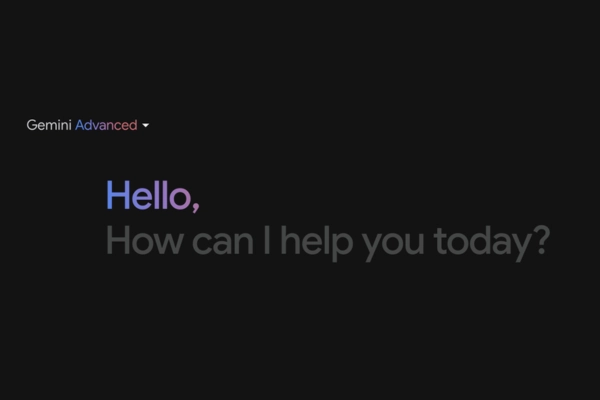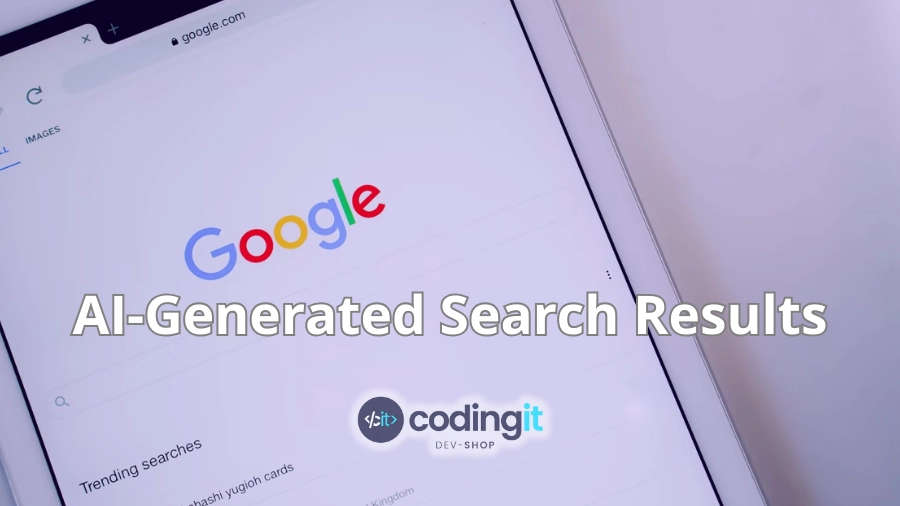Businesses, bloggers, and content creators have built their digital presence around Google for years. The strategy was clear: optimize for search, rank high, and watch organic traffic flow in. But while that playbook is still relevant, you may have noticed that following it can’t guarantee you success. Google is no longer just a search engine that directs users to the best sources. It’s becoming the source itself.
AI-generated search results are redefining how information is accessed. Instead of offering a list of links, Google’s AI now processes content, synthesizes information, and presents direct answers within the search results. This shift is already impacting websites that rely on informational search traffic, making it harder for businesses to attract users through traditional means. Click-through rates are dropping, and the competition is no longer just other content creators, it’s Google itself.
This change raises fundamental questions about the future of content strategy. If users no longer need to visit a website to get answers, what role does content play? If SEO, as we know it, is losing effectiveness, what will replace it? The focus must shift from merely ranking on Google to creating content that remains valuable even in an AI-driven search environment.
The challenge now is not just visibility but relevance. Content must be structured for both human readers and AI-driven search algorithms. Authority, expertise, and clarity have never been more critical. Traditional SEO principles still matter, you better keep following them, but they are no longer enough. The future belongs to those who understand how AI processes information and optimizes for a world where search engines are now content creators.
Businesses that adapt will find opportunities in this new landscape. Those who resist will struggle to be seen. Understand how to navigate AI-powered search and the results will come.
Blog Summary
In this guide, we’ll break down:
- Why organic traffic is declining and what it means for your content.
- How EEAT influences search rankings.
- How to optimize for AI-driven search results.
- The human elements of content that remain valuable.
- Why brand visibility is just as important as website visits.
- Businesses that resist change will struggle to stay relevant.
- How expert strategies can help businesses adapt and thrive.

Table of Contents
The End of Click-Based SEO?
The decline in click-through rates is more than an algorithm shift. It has been a fundamental change in how people consume information. Google’s AI-generated search results give users direct answers, eliminating the need to visit external sites. The behavior that once fueled organic search traffic is evolving. Instead of scanning a list of links and choosing the best one, users are now trusting AI-generated responses without leaving the search page.
This presents a new challenge: if users get what they need without clicking, what happens to the content behind those answers? Websites that once relied on informational searches for visibility and conversions now face a reality where their content is being used but not visited. Beyond losing clicks, businesses are losing control of how information is presented and attributed.
Google’s AI Gemini doesn’t cite sources exactly the same way traditional search did. Even if your content contributes to an AI-generated answer, users may never see your brand name or visit your site. This means we must rethink what success in a search actually looks like. Traffic can no longer be the primary measure of content effectiveness. Instead, businesses need to consider brand visibility, authority building, and engagement outside of search results.
Who Google Trusts Now
Google used to reward content based on structure: keywords, backlinks, and technical SEO best practices. They still matter, but they’re no longer the only deciding factors in an AI-driven search landscape. Authority is not optimizing for an algorithm or catering to users. It’s about doing both.
Google’s evolving search model now favors signals that indicate real-world credibility. The shift toward EEAT (Experience, Expertise, Authority, Trustworthiness) means search engines aren’t only evaluating what’s written on a webpage. They’re analyzing who is writing it, where else they’re referenced, and whether their knowledge extends beyond their platform.
This forces a slight shift in strategy. Businesses that want to stay visible need to invest beyond content production. Recognition across reputable platforms, expert collaborations, and clear author credentials all contribute to how search engines determine authority. The challenge now is making sure AI-driven search sees and trusts your expertise.
Structuring Content for AI Search
Metadata has become the foundation of visibility since search engines are extracting meaning from pages. Clear structured data, author attribution, and well-defined metadata give AI the context it needs to determine who you are, what you offer, and whether your content should be trusted. Without this, even the most well-researched content can be overlooked or misrepresented in AI-generated search results.
Unlike traditional search optimization, Generative Engine Optimization (GEO) requires a deeper understanding of how AI processes and generates responses. Content needs to be machine-readable, contextually clear, and formatted for AI models that determine what users see. This means refining metadata, structuring content for AI comprehension, and ensuring that key insights are surfaced in a way that makes them hard to ignore or misattribute.
What Kind of Content Still Works?
Since AI is taking over the role of summarizing information, we might need to rethink what we create, not just how we optimize it. Informational content alone might not be enough to drive engagement. Users aren’t looking for just another answer; they’re looking for depth, perspective, and insight they can’t get from a machine-generated response.
Generic, surface-level content is the first to become irrelevant. Articles that merely restate commonly known facts will struggle to attract attention, let alone clicks. AI can do that faster, and Google will serve it up before users ever reach the original source.
Depth matters more than ever. Content that breaks down complex topics, offers unique perspectives, and provides real-world applications will continue to stand out. So will opinion pieces, case studies, and investigative content that require actual human judgment.
Will video still work? Well, it’s not an automatic safeguard against AI disruption, so it needs to be approached strategically. Some AI are already extracting insights from videos and summarizing them.
This doesn’t mean video is irrelevant, it just means it should serve a purpose beyond simple information delivery. If the goal is to compete with AI, videos must do something AI can’t easily replace: showcase personality.

What AI Can’t Replicate
AI can generate summaries, rewrite text, and even predict what users want to know, but it can’t think the way we, as humans, do. It doesn’t have opinions, emotions, or the ability to create something genuinely original. Businesses that rely on AI-generated search traffic alone are playing a short-term game. Those who build content with human creativity at its core are the ones who will remain valuable, no matter how search evolves.
AI is efficient, we can give them that, but it lacks intent. It pulls from existing data, repackages it, and presents the most statistically probable answer. What it doesn’t do is offer personal insight, challenge conventional wisdom, or tell a compelling story. That’s where human creativity for development or to create content still has an advantage. The value of original analysis, storytelling, and experience-driven perspectives is increasing, not decreasing.
This is why content strategies need to focus on what AI can’t replicate. Thought leadership, in-depth research, and emotionally resonant narratives hold more weight than generic information. AI may be reshaping search, but people still connect with people. Businesses that inject originality, voice, and depth into their content will not only stand out to users, they’ll also stand out to AI models looking for authoritative, high-quality sources.
Beyond Clicks and Traffic
Organic traffic has been a primary measure of content success for many. If a page ranked high, it brought in visitors. With more visitors, more leads, more conversions, and more business. But with the reduction of click-through rates, businesses must reconsider how they define success in search.
Brand visibility is becoming just as important as clicks. If your content is referenced in AI-generated search results, your brand is still being positioned as a trusted name, even if users aren’t clicking through. The challenge now is making sure your brand is part of the AI-generated conversation.
Engagement outside of search is another key factor. Businesses that diversify their content distribution reduce their dependence on Google’s algorithm. AI-driven search isn’t the only way to reach an audience, and companies that invest in a multi-channel presence will have a stronger long-term position.
The Comfort Trap
Adaptation starts with a shift in mindset. Instead of seeing search as a traffic funnel, you need to treat it as an exposure engine. Even if AI-generated search results reduce direct clicks, appearing in those answers still builds credibility. The goal should be to become the source that AI trusts. One that search engines pull from consistently.
The biggest threat to businesses in this AI-driven search era is their reluctance to change. Many companies will continue to rely on outdated SEO strategies, believing that minor tweaks will be enough to maintain visibility. They won’t be.
The shift to AI-powered search will require a structural change in how information is processed, ranked, and delivered. Companies that fail to recognize this will fall behind, relying on strategies that no longer work while competitors build authority, optimize for AI, and expand their reach beyond traditional search.
Another risk is relying on a generic approach. Many businesses will look for quick solutions that promise easy results. But AI search favors expertise, originality, and structured clarity. Businesses that don’t invest in real expertise and tailored content architecture will find themselves pushed out of AI-generated search results.
The Right Partners Will Define the Future
The path to success requires more than guesswork. Triumph today demands technical expertise, data-driven strategies, and an understanding of how search algorithms evolve. Businesses that want to stay visible need partners with real technical knowledge, the right frameworks, and the ability to navigate the complexity of AI-powered search.
CodingIT doesn’t just optimize for search, we engineer content architectures that ensure businesses stay relevant in a world where AI is rewriting the rules. The companies that invest in technical SEO, content strategy, and AI-driven optimization today will be the ones dominating search tomorrow. Don’t wait until AI search leaves your content behind. Book a session with CodingIT today and build a search strategy that works in the AI era.
